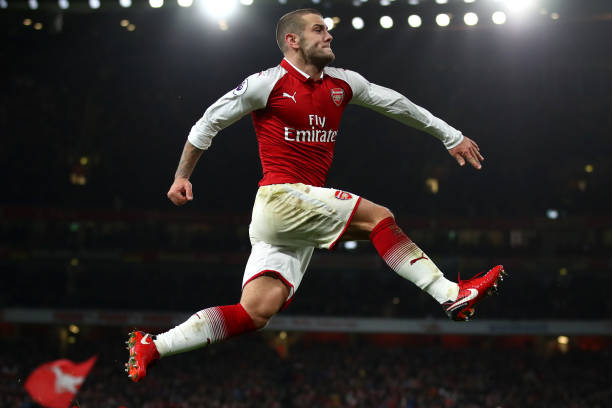Jack Wilshere has revealed that he’s been gluten and dairy-free for six weeks but what impact will that actually have on his health – if any?
After scoring against Chelsea mid-week, Jack revealed that he’s been making some dietary changes recently and not only has been working on his weight loss, he reckons he feels better.
“I’ve been dairy- and gluten-free for six weeks,” the 26-year-old revealed. “My kids since birth gave been dairy- and gluten-free. The few times I’ve had dairy in the hotel I’ve had an upset stomach.
““But I just cut it out completely and I think I look better. I’ve certainly lost a little bit of weight. I’m leaner and probably a little bit fitter as well. I feel I can last longer. At the end [of the draw against Chelsea] when we scored the second goal I thought: ‘Come on, we can go again.’ I felt good.”
Cutting out dairy and gluten will naturally lead to some weight loss, especially alongside training. Mainly because all the good stuff like cheese, cakes, bread, cream etc contains them. Therefore, cutting them out cuts your calories and restricts the amount of processed crap you can put in your mouth.
Also, if Jack was feeling some digestive discomfort, which athletes tend to, after eating certain foods, it’s natural that he’ll feel better after cutting them out.
According to a blog from the New York Times, as many as 90% of athletes experience bloating, cramps, diarrhea and other gastrointestinal symptoms during or after exercise. This is because the exertion diverts blood and fluids from the digestive system to areas of the body where they are needed more. Such as the leg muscles.
Therefore, on the face of it, I’m not at all surprised that Jack does feel a little better since giving up dairy and gluten. However, according to studies, cutting either from your diet doesn’t actually directly help performance.
In 2015, Australian Ph.D. candidate, Dana Lis, decided to test the theory that cutting out gluten especially could help athletes perform better.
Lis and her colleagues cooked up two different types of sports bar: one with gluten, one without.

She then gave them to 13 male and female competitive cyclists with no known gluten sensitivities and tested their fitness before and after a week of eating a gluten-free diet. They would then switch to a full gluten diet, stick to this for a week and their results would be recorded again.
Obviously, she didn’t tell either which ones they were getting and their diets had to be otherwise gluten-free.
Lis found that the results were basically identical and completely threw out the notion that cutting out gluten from your diet can help you perform better.
“An athlete’s nutrient intake and timing are so critical to performance,” Lis concluded. “I hope that people learn to be more objective in terms of what they hear and read about gluten-free diets and nutrition in general.”
While Jack must obviously feel better, it doesn’t look as if it’s directly down to his new diet. However, his new regime could still be helping him in other ways.
By cutting weight, he’s lighter on his feet. If he’s not feeling unwell, he’ll also have more energy. It also helps him focus and take more notice of what he’s eating in general.
If it makes him feel as if it’s making a difference, that’s up to him. But you won’t catch me ditching the bread any time soon.

